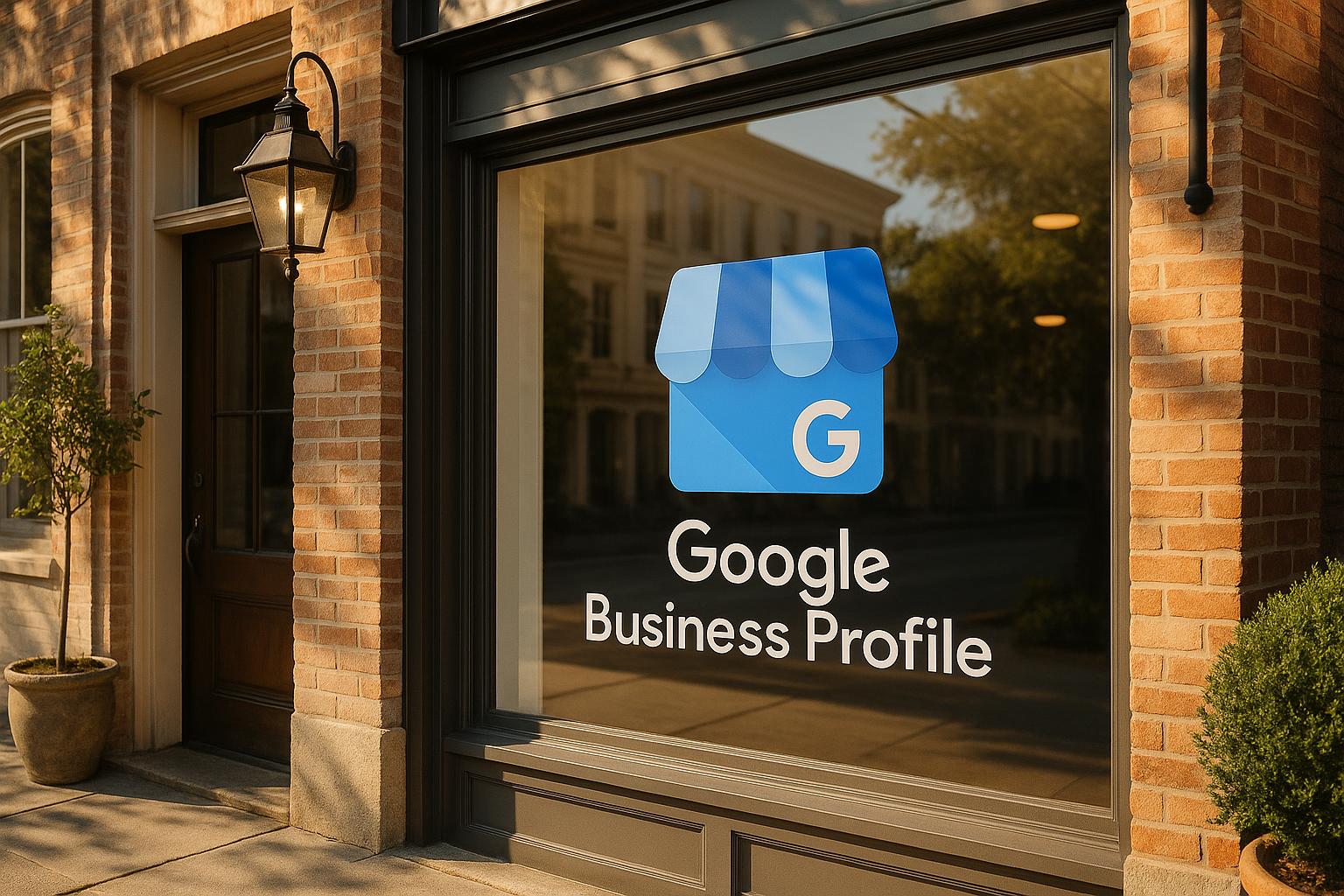Want more customers in Charleston? Start with your Google Business Profile.
Here’s why:
- 46% of Google searches are local.
- 88% of local mobile searches lead to a visit within 24 hours.
- Businesses with photos get 42% more direction requests and 35% more website clicks.
If your profile isn’t optimized, you’re missing out on tourists and locals looking for businesses like yours.
What to do:
- Keep your business info accurate (name, address, phone, hours).
- Choose the right categories and attributes to rank higher.
- Add high-quality photos and videos to stand out.
- Use Charleston-specific keywords and highlight local events.
- Manage reviews professionally – positive ones build trust, and quick responses matter.
Pro tip: Dive into advanced strategies like schema markup, local citations, and Google Insights for even better results.
Optimize your profile today to connect with Charleston’s thriving audience of locals and visitors.
Google Business Profile Optimization: 20 Expert Tips to Dominate Local Search in 2025
How to Optimize Your Google Business Profile
Optimizing your Google Business Profile is essential for showcasing your Charleston business and making it easy for both locals and visitors to find you. The key steps involve ensuring your business details are accurate, selecting the best categories and attributes, and using visuals that highlight what makes your business special. Let’s dive into the specifics.
Keep Your Business Information Accurate
Start by keeping your NAP (Name, Address, Phone number) consistent across all platforms. Claim and verify your profile to ensure you have full control over the details. Your business name should appear exactly as it does on your signage, business license, and other official documents. As Google advises:
"Represent your business as it’s consistently represented and recognized in the real world across signage, stationery, and other branding."
Avoid adding extra keywords to your business name for ranking purposes. For example, if your restaurant is called "Magnolia Café", stick with that instead of adding terms like "Magnolia Café Charleston Breakfast Spot". Accuracy matters, especially in Charleston, where the historic layout and similar street names can confuse potential customers if your address isn’t precise.
Your phone number should connect directly to your business location and be available during your operating hours. If you manage multiple Charleston locations, each one should have its own unique contact number. Include your business hours and keep them updated, especially during holidays or special events, so customers know exactly when you’re open.
Select the Right Categories and Attributes
Choosing the right categories is a game-changer for your profile. Your primary category should describe your business as a whole, while secondary categories can highlight additional services or products. Selecting the most relevant primary category can significantly improve your local search ranking. As Kyle Sanders from Complete SEO puts it:
"Make sure you have the most relevant, current category selected for your primary category. We’ve seen instances where clients see a jump in 5-10 positions simply from moving the most relevant category from secondary to primary."
You can select one primary category and up to nine secondary categories. These should align closely with your business offerings. Take a look at your competitors – search for your target keywords and see which categories they’ve selected. Additionally, use attributes like "wheelchair accessible", "outdoor seating", "accepts credit cards", or "dog-friendly" to provide extra details that make your business more appealing. Since Google updates its categories periodically, revisit your selections regularly to stay current.
Once your categories and attributes are set, it’s time to enhance your profile with photos and videos.
Upload Photos and Videos
Visual content is a powerful tool for making your business stand out. Upload high-quality, geo-tagged photos and videos that showcase your business and its surroundings. Include exterior shots that make it easy for customers to recognize your location, as well as interior photos that highlight key features, whether it’s a welcoming dining area or a sleek workspace.
For businesses offering products or services, include photos that demonstrate what you provide. Restaurants can feature their signature dishes, while retail stores might highlight popular items. Adding team photos can also help build trust by giving your business a personal touch.
Keep your visuals fresh by updating them regularly. Highlight seasonal décor, holiday themes, or special events to keep your profile engaging. Short videos – such as behind-the-scenes clips, customer testimonials, or action shots of your business – can further capture attention. Use your visual content to reflect Charleston’s unique charm and give potential customers a feel for what they can expect when they visit.
Use Charleston-Specific Content to Improve Local Visibility
If you’re looking to connect with Charleston locals and improve your visibility in search results, creating content that reflects the city’s unique character is a must. By incorporating Charleston-specific elements, your Google Business Profile not only gets a local SEO boost but also shows your deep connection to the community.
Write Business Descriptions with Local Keywords
Your business description is the perfect place to weave in Charleston-specific keywords. Start by figuring out the phrases your customers are likely to use when searching for businesses like yours. Don’t just stick with "Charleston" – include neighborhood names, well-known landmarks, and other relevant terms. For instance, you might reference areas like West Ashley, Mount Pleasant, North Charleston, James Island, or Daniel Island. If your services cater to a niche audience, tailor your keywords to match. A wedding planner, for example, could use terms like "Charleston plantation weddings" or "historic venue weddings", while a fitness studio might highlight "downtown Charleston yoga" or "King Street fitness."
Pairing industry-specific keywords with local terms can also help you attract high-intent searches. Think phrases like "best Charleston seafood" or "top-rated Mount Pleasant dentist" to capture the attention of people ready to make a decision.
Crimson Park Digital emphasizes the power of this strategy:
"You can enhance your search presence by incorporating Charleston-specific keywords and referencing well-known neighborhoods, landmarks, and events within your content. Not only will this boost your local search rankings, but it also demonstrates your business’s familiarity with the area."
The impact can be impressive. Take Lowcountry Luxe, for example – a luxury candle boutique based in Charleston. By optimizing their product pages with references to local landmarks, they saw a 250% increase in organic website traffic and a 300% boost in online sales within just a year.
When crafting your business description, don’t forget to mention iconic Charleston spots like Rainbow Row, The Battery, Waterfront Park, or the Ravenel Bridge. You can also include references like "steps from Marion Square" or "serving the Historic District" to highlight your local ties. These details not only help your content resonate with Charleston audiences but also prepare your profile for dynamic, engaging posts.
Create Posts for Local Customers
Google Business Profile posts are a fantastic way for Charleston businesses to share updates, promotions, and local content. Posting regularly – ideally once a week – keeps your profile active and ensures your content stays fresh and relevant for both Google and potential customers.
Use these posts to showcase your involvement in Charleston’s vibrant community. For example, highlight your participation in events like the Charleston Wine + Food Festival, Charleston Fashion Week, or the Southeastern Wildlife Exposition to draw in event attendees. You can also tailor your promotions to Charleston’s tourism seasons, offering special deals during peak visitor times or unique incentives during quieter months.
Make your posts visually engaging by featuring eye-catching images of your products or services in a Charleston-centric context. For instance, if you’re launching a new brunch menu, you might promote it as "perfect for post-Farmers Market dining." Or, if you’ve expanded your service area, let people know you’re "now serving Daniel Island families." Sharing awards, recognitions, or your participation in local events can also help build credibility within the community.
Here’s a key stat to keep in mind: over 76% of local mobile searches lead to a store visit within 24 hours. That means your posts could be the final nudge someone needs to visit your business. Use this opportunity to reflect Charleston’s historic charm, celebrate its lively culture, and address what’s important to the community. Successful Charleston businesses often use their posts to join the local conversation – whether it’s sharing news, cheering on local sports teams, or showcasing seasonal décor. By doing so, they turn their Google Business Profile into a hub for local engagement, laying the groundwork for stronger customer relationships and a better reputation.
Manage Customer Reviews to Build Your Local Reputation
Customer reviews are today’s version of word-of-mouth, shaping how people perceive your business. With 89% of consumers expecting business owners to respond to all types of reviews, managing feedback online has become a must, not a choice. Reviews also influence how your business ranks on Google, meaning consistently positive feedback can bring in new customers. Simply put, managing reviews is a crucial piece of your local SEO strategy.
Get More Positive Reviews
The first step to managing reviews is making it easy for happy customers to leave them. After a positive interaction, encourage customers to share their experiences by providing clear links to your Google Business Profile. You can include these links in emails, business cards, or thank-you pages. For in-person businesses, placing QR codes or links near checkout or service areas makes it even simpler for customers to leave a review on the spot.
Follow-up emails are especially effective for service-based businesses. Sending a personalized email within 24–48 hours of completing a service, thanking the customer, and including a direct review link can increase responses. Restaurants and retail stores might consider offering small perks, like discounts on future visits, in exchange for honest reviews. Social media is another great avenue – when customers mention your business positively on platforms like Instagram or Twitter, engage with them and suggest they leave a formal review on Google or similar sites. Training your staff to naturally ask for reviews during positive interactions can also make a big difference.
Respond to Reviews Professionally
Businesses that reply to Google reviews are viewed as 1.7 times more trustworthy than those that don’t. Responding promptly and thoughtfully to all types of reviews – positive, negative, and neutral – matters. For 36% of customers, a response within one day is ideal, while another 30% are satisfied with a reply within three days.
When responding to positive reviews, personalize your replies by mentioning specific details from the customer’s feedback. For instance, if someone raves about your "delicious shrimp and grits" or highlights "exceptional service during the busy tourist season", acknowledge those points to show you genuinely appreciate their input.
Handling negative reviews requires extra care but can be an opportunity to improve. 69% of consumers expect an apology for a bad experience. Start by acknowledging their concerns sincerely, take responsibility where appropriate, and offer a solution – whether it’s a refund, replacement, or store credit. Provide contact information to resolve the issue offline and demonstrate your commitment to customer satisfaction.
Don’t ignore neutral reviews either. Thank the reviewer, ask for more details if their comments are vague, and offer to address any potential concerns. Even questionable or inappropriate reviews deserve a polite response, and you can report inappropriate content to the review platform when necessary.
Use Review Monitoring Tools
To stay on top of reviews, consider using specialized tools that help you monitor and manage feedback efficiently. Review monitoring tools send real-time alerts for new reviews, allowing you to respond quickly and meet customer expectations. For example, SearchX‘s review monitoring services help Charleston businesses by consolidating reviews from multiple platforms into a single dashboard. This setup ensures no feedback is overlooked and provides valuable analytics to track trends, review volume, and customer sentiment over time.
Automated tools can also help turn satisfied customers into advocates by sending follow-up messages at the right time after a purchase or service. As one expert puts it:
"We help businesses take control of their online reputation with smart, automated review management and reputation monitoring tools. Our system makes it easy to gather positive customer feedback, respond to reviews, and grow your presence across crucial platforms like Google, Yelp, and Facebook – all while staying true to your brand." – Digital Coast Marketing
Set up alerts for new reviews to ensure you can respond promptly. Many tools also let you track key metrics such as response rates, average ratings, and review frequency. These insights can help you spot trends and identify areas for improvement. Some systems even provide response templates and analytics to maintain professional and consistent communication. By integrating these tools into your local SEO strategy, you can strengthen your online reputation and attract more customers.
sbb-itb-880d5b6
Advanced Local SEO Techniques
Once you’ve nailed the basics, it’s time to take your local SEO game to the next level. These advanced strategies are designed to amplify your business’s visibility and impact. Building on foundational tactics like profile optimization and review management, these techniques will help you stand out even more in local search results.
Add Local Business Schema Markup
Schema markup is like a secret language that helps search engines better understand your business details. By adding this markup, you can clearly communicate key information like your address, phone number, hours of operation, payment methods, and service areas. Depending on your industry, you can use schema types such as LocalBusiness, Restaurant, or ProfessionalService. Not sure where to start? Check out SearchX’s guide for a step-by-step walkthrough.
Once you’ve implemented schema markup, take it a step further by using insights from your Google Business Profile to fine-tune your strategy and ensure everything aligns with how customers are searching for your business.
Use Google Business Profile Insights
Your Google Business Profile analytics is a treasure trove of information about how people are finding and interacting with your business. Dive into metrics like direct and discovery searches, website clicks, requests for directions, and phone calls to see what’s working and where there’s room for improvement.
For instance, if you notice a lot of direction requests but not many website clicks, it could be a sign that your website link or business description needs a refresh. Pay close attention to the search terms driving traffic and any seasonal trends – they can help you refine your keyword strategy.
And don’t overlook the messaging feature. Customer questions from this tool can reveal gaps in your website content, like missing details in your FAQ section. Addressing these questions proactively can improve both your customer experience and your search rankings.
Fix Local Citations
Local citations – mentions of your business’s name, address, and phone number (NAP) across directories and platforms – are essential for building trust with both search engines and customers. Consistency is key here. Even small discrepancies, like formatting differences in your address, can confuse search engines and hurt your rankings.
Start with a comprehensive citation audit to pinpoint and fix any inaccuracies. Focus on high-value directories like Google Business Profile, Yelp, Facebook, and the Better Business Bureau. For businesses in Charleston, local-specific listings such as Charleston Regional Business Journal, Charleston.com, and Holy City Sinner are also crucial.
Common issues to watch for include inconsistent information, duplicate listings, and outdated citations. If you find duplicate entries, address them quickly – either by contacting the platform or consolidating the listings – to avoid splitting your citation authority. Make sure your NAP is standardized across all directories.
To simplify the process, consider using tools like SearchX’s local SEO solutions. These tools can help you track your citations, monitor changes, and ensure consistency across platforms. If you come across incorrect information, don’t hesitate to reach out to the website owner to get it corrected promptly.
Key Takeaways for Charleston Businesses
Optimizing your Google Business Profile is a game-changer for local search success in Charleston. With 46% of all Google searches focused on local information and 76% of people visiting a nearby business within 24 hours of their search, getting this right can directly impact your bottom line.
Start with the basics: make sure your business details – like address, phone number, and operating hours – are accurate and consistently updated. These small details can make a big difference in your local search rankings. Choose the most relevant categories and attributes for your business, and don’t underestimate the power of visuals. High-quality photos and videos that highlight what sets your Charleston business apart can make a strong impression.
Next, focus on local content to stand out in Charleston’s competitive market. Use Charleston-specific keywords, such as "Charleston bakery" or "Mount Pleasant plumber", in your business description and website. Highlighting local events like the Spoleto Festival or Charleston Wine + Food Festival can also help you connect with the community. For even more impact, consider creating pages dedicated to neighborhoods like West Ashley or Folly Beach. This hyper-local approach helps you attract customers who are actively searching for businesses in their area.
Managing your online reputation is just as important. Customer reviews play a huge role in shaping how people perceive your business. Did you know that a one-star increase on Yelp can boost revenue by 5% to 9%? On the flip side, a single negative review could cost you up to 30 potential customers. Responding to reviews quickly – ideally within 24 to 48 hours – is key. Keep your tone professional and courteous, and don’t hesitate to ask happy customers for reviews; 77% of people say they’re willing to leave one when asked.
Once you’ve nailed the essentials, advanced tactics can take your visibility to the next level. Tools like schema markup and consistent citations across online directories help search engines trust your business. Use Google Business Profile Insights to monitor your performance and spot areas for improvement. Consistency in citations ensures your business information is reliable across the web, further boosting your credibility.
Charleston’s market has its own unique flavor, and your strategy should reflect that. By combining accurate details, locally tailored content, active review management, and advanced SEO techniques, you can attract more local searches and turn them into loyal customers.
FAQs
How can I use Charleston-specific keywords to boost my Google Business Profile’s local visibility?
To boost your presence locally, make sure to weave Charleston-specific keywords into your business description, posts, and updates. Words like "Charleston", "Downtown Charleston", or well-known neighborhood names can help you connect with your audience. Showcase the local services or products you provide, and use phrases that speak directly to Charleston residents or tourists. Keep your profile fresh by regularly adding new, location-centered content to stay relevant and draw in nearby customers.
How can I effectively manage customer reviews on my Google Business Profile to boost my local reputation?
Managing customer reviews on your Google Business Profile plays a big role in earning trust and boosting your local presence. Start by engaging with every review – thank happy customers to show your gratitude and handle negative feedback with professionalism and care. This not only reflects your dedication to great service but also helps build a stronger connection with your audience.
Encourage your satisfied customers to share their experiences by providing simple tools like review links or QR codes. Just make sure to steer clear of offering incentives, as this goes against Google’s guidelines. Keep a close eye on your reviews, and if you spot any that violate content policies, report them to maintain a profile that feels trustworthy and welcoming. Being consistent and responsive can go a long way in strengthening your reputation and drawing in more local customers.
How can strategies like schema markup and local citations help my Charleston business get noticed in local searches?
Advanced Local SEO Strategies for Charleston Businesses
If you’re looking to boost your business’s visibility in Charleston, advanced local SEO techniques like schema markup and local citations can make a significant difference.
Schema markup is a powerful tool that helps search engines understand key details about your business – like your name, address, phone number (NAP), operating hours, and even customer reviews. When search engines can easily interpret this information, they’re more likely to showcase it prominently in search results. The result? Better local rankings and higher click-through rates.
On the other hand, local citations – mentions of your business on reputable directories and websites – play a crucial role in establishing your credibility within the community. Consistency is key here. Ensuring that your business information is accurate and uniform across all platforms not only builds trust with search engines but also reassures potential customers.
In a bustling and competitive market like Charleston, these strategies can be the game-changer your business needs to stand out in local search results.




